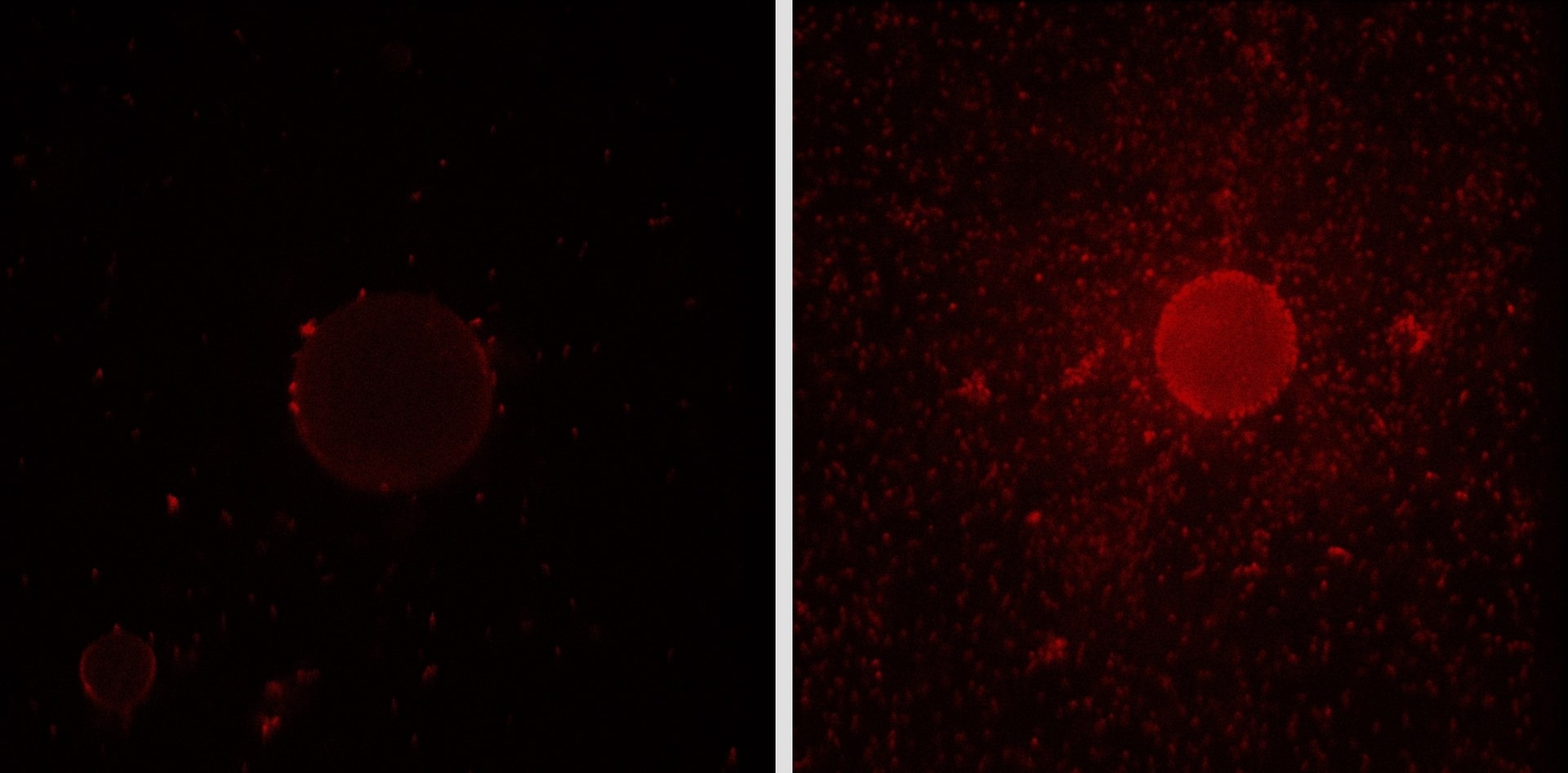Reviewed by Lexie CornerMay 12 2025
The marine bacterium Alcanivorax borkumensis feeds on oil and often multiplies quickly after oil spills, helping to reduce pollution. It does this by producing a natural compound that acts like a mild detergent, allowing it to stick to oil droplets.
 The red-marked bacteria with the gene cluster switched off - were no longer able to synthesize the detergent. The bacteria were then unable to attach to the surface of oil droplets (left) the way they usually do (right). Image Credit: Dr. Dörmann’s working group / University of Bonn
The red-marked bacteria with the gene cluster switched off - were no longer able to synthesize the detergent. The bacteria were then unable to attach to the surface of oil droplets (left) the way they usually do (right). Image Credit: Dr. Dörmann’s working group / University of Bonn
A research team from the University of Bonn, RWTH Aachen University, Heinrich Heine University Düsseldorf, and Forschungszentrum Jülich has identified how Alcanivorax borkumensis produces the compound that helps it break down oil. Their findings, published in Nature Chemical Biology, could support efforts to develop more effective strains of oil-degrading bacteria.
The name Alcanivorax borkumensis roughly means “alkane eaters from Borkum,” reflecting the bacterium’s ability to consume alkanes - hydrocarbon chains commonly found in petroleum.
A. borkumensis uses energy-rich hydrocarbon chains that occur naturally in marine environments or are introduced through oil spills. In many cases, it reproduces quickly, helping to speed up the breakdown of oil pollution.
Oil and Water Do Not Mix
Because oil and water do not mix, the bacterium needs a chemical agent to access its food. It produces this agent itself - a natural compound similar to dishwashing liquid.
This compound is made from the amino acid glycine and a sugar-fatty acid molecule.
The molecules have a water-soluble part and a fat-soluble part. The bacteria settle on the surface of the oil droplets, where they form a biofilm.
Peter Dörmann, Professor and Biochemist, Institute of Molecular Physiology and Biotechnology of Plants, University of Bonn
The way this oil-degrading compound is made by Alcanivorax borkumensis was not fully understood until the research team conducted a detailed study of the bacterium’s genome.
“In our research, we identified a gene cluster that we believed could be involved in the production of the molecule,” Professor Jaeger stated.
When the researchers turned off a specific group of genes, the bacteria were less able to stick to oil droplets.
“As a result, they absorbed less oil and grew much more slowly,” noted Professor Lars Blank from RWTH Aachen University.
Potential Biotech Applications
Jiaxin Cui, a doctoral student of Professor Dörmann, was able to map out the pathway by which A. borkumensis produces its oil-degrading compound. The process involves three enzymes, with the molecule being built step by step. The three related genes contain the instructions needed to produce these enzymes, which are essential for forming the compound efficiently.
“We successfully transferred the genes involved to a different bacterium, which then produced the detergent as well,” Cui explained.
Bacteria like A. borkumensis play an important role in breaking down oil pollution, so these findings may help in developing more effective strains.
“This natural detergent could have biotech applications as well, such as for microbial production of key chemical compounds from hydrocarbons,” stated Dörmann, who is affiliated with the University of Bonn Transdisciplinary Research Area (TRA) “Sustainable Futures.”
Source:
Journal reference:
Cui, J., et al. (2025) Biosurfactant biosynthesis by Alcanivorax borkumensis and its role in oil biodegradation. Nature Chemical Biology. doi.org/10.1038/s41589-025-01908-1.